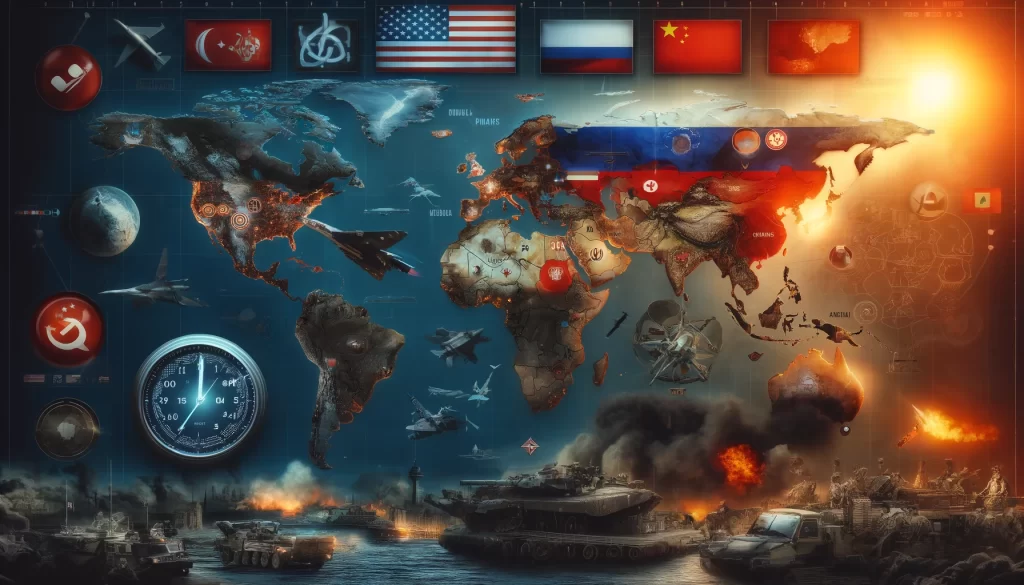
The contemporary international scenario is marked by growing tensions that raise concerns about the possibility of a major global conflict., similar to the First and Second World Wars. To understand whether we are really on the brink of a third world war, It is essential to draw historical parallels and identify patterns that may indicate the repetition of destructive cycles. Among these patterns, the increase in xenophobia and geopolitical tensions stand out, that are present today in different parts of the world.
During the First World War, Europe was immersed in a web of complex alliances and conflicts of national interests, which culminated in the assassination of Archduke Franz Ferdinand in 1914 and the subsequent declaration of war. In a similar way, the Second World War emerged from a scenario of deep dissatisfaction with the results of the Treaty of Versailles, who imposed severe penalties on Germany, in addition to the growth of totalitarian regimes. Both conflicts were preceded by periods of heightened nationalism, xenophobia and economic and military rivalries.
currently, there is a worrying increase in xenophobia and nationalism in several regions of the world. In the United States and Europe, Populist political movements have gained strength, promoting anti-immigration policies and rhetoric of “us against them”. This phenomenon is not exclusive to the West. In India, the rise of Hindu nationalism has generated internal religious and ethnic tensions. In China, the policy of “Sinicization” imposed by Xi Jinping's government has caused reprisals against ethnic minorities, like Muslim Uyghurs. These dynamics are reminiscent of the nationalist sentiments that preceded the two world wars., creating an environment of distrust and hostility between nations and within themselves.
Beyond xenophobia, current geopolitical tensions evoke memories of the preludes to the great wars of the 20th century. In Europe, the Russian invasion of Ukraine in 2022 reignited fears of large-scale conflicts on the continent. The annexation of Crimea in 2014 and continued Russian interventions in Ukrainian affairs are reflections of a Russia seeking to reassert its power and influence, similar to the territorial ambitions observed in the decades of 1930 e 1940. The international response, marked by economic sanctions and military support for Ukraine, recalls the alliance alignments that marked the First World War.
Not Pacific, the growing rivalry between the United States and China over the issue of Taiwan and dominance of the South China Sea raises concerns about a direct military conflict. China's assertiveness in expanding its territorial and economic influence in the region has led to an arms race, with the United States strengthening its alliances with countries like Japan, Australia and India, in a strategy reminiscent of the containment of Japanese expansionism before the Second World War.
In other regions, Local conflicts also contribute to global instability. In the Middle East, the wars in Syria and Yemen, tensions between Israel and Iran, and sectarian rivalries continue to destabilize the region. In Africa, clashes in countries such as Ethiopia and the Central African Republic, as well as the threat from extremist groups in areas such as the Sahel, add layers of complexity to the global scenario.
Historical parallels and observable patterns suggest the world is in a state of alert. However, there are significant differences that could serve as a barrier against an imminent world war. Lessons learned from past conflicts, the presence of international organizations such as the UN, and multilateral diplomacy mechanisms offer paths to the peaceful resolution of conflicts. Global economic interdependence also serves as an important deterrent, as economies are more interconnected than ever.
In conclusion, although current international tensions show alarming patterns similar to those that preceded the two world wars, the modern context has mitigating factors that could prevent a global conflict of similar scale. However, It is imperative that nations work together to de-escalate tensions and promote international cooperation, in order to avoid the horrors of a new world war.
